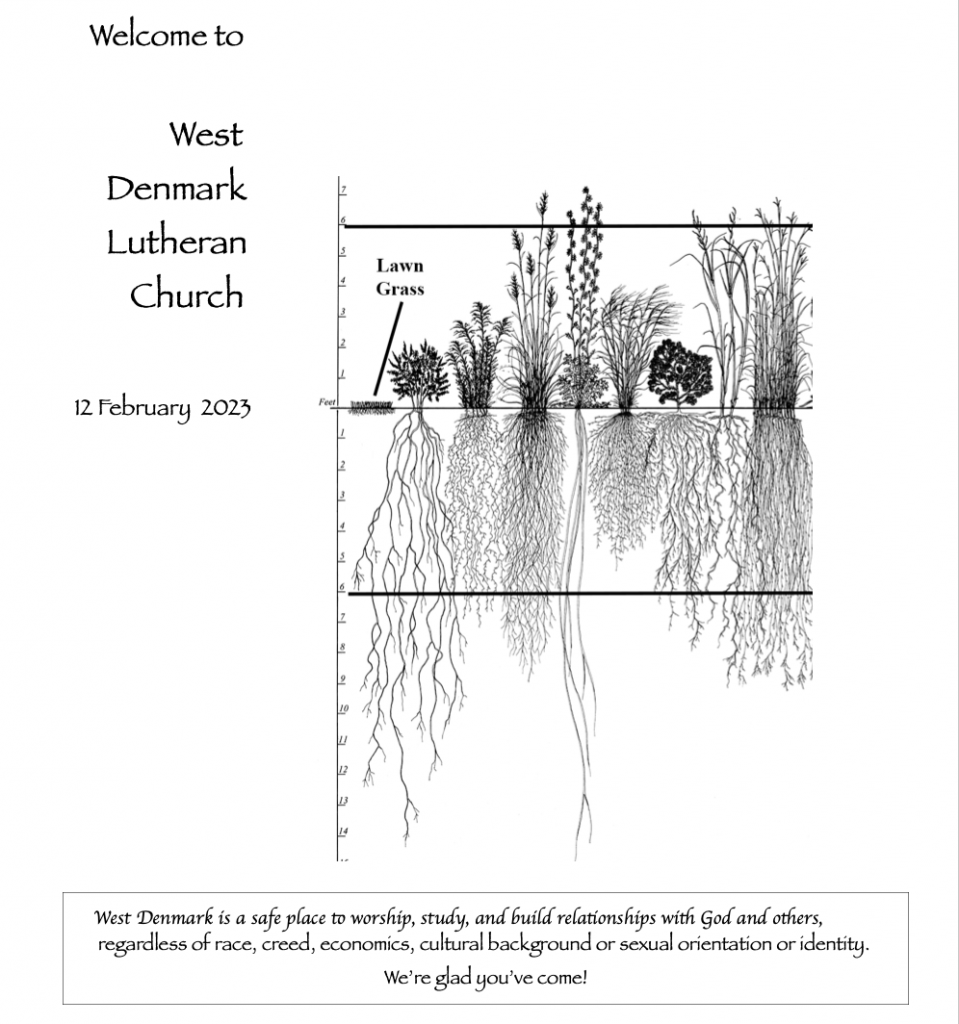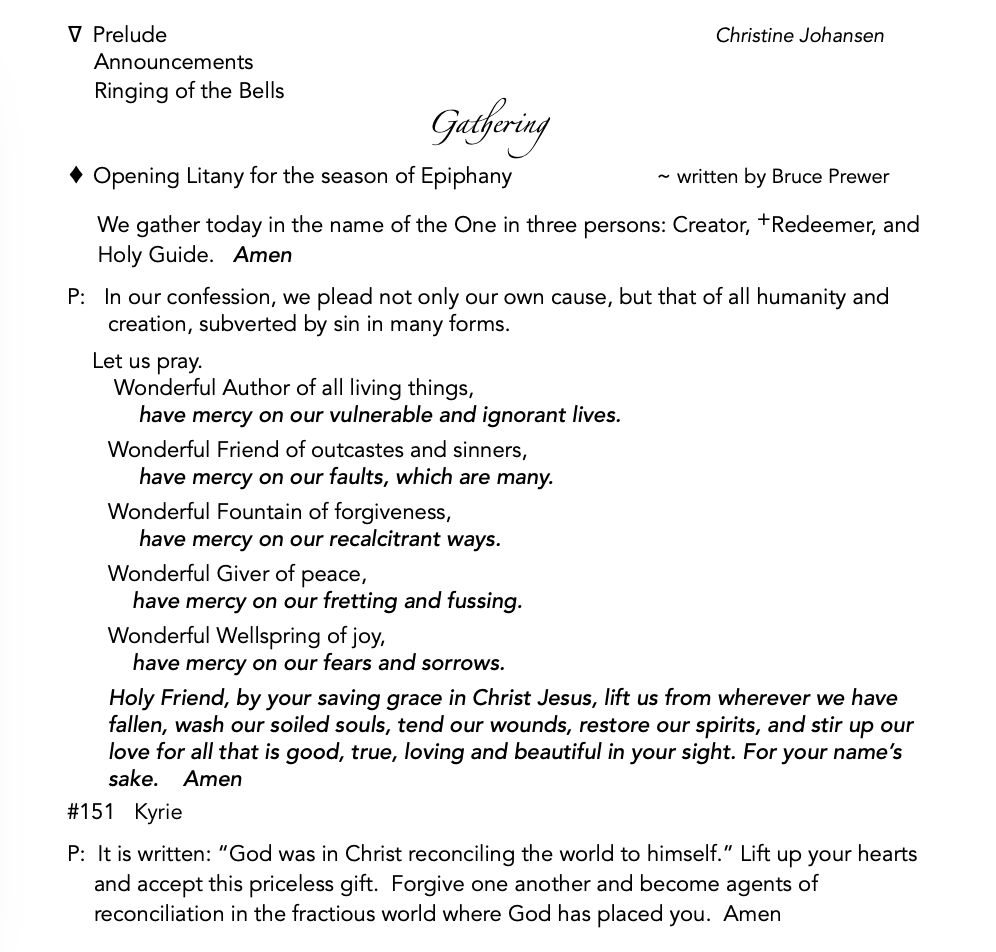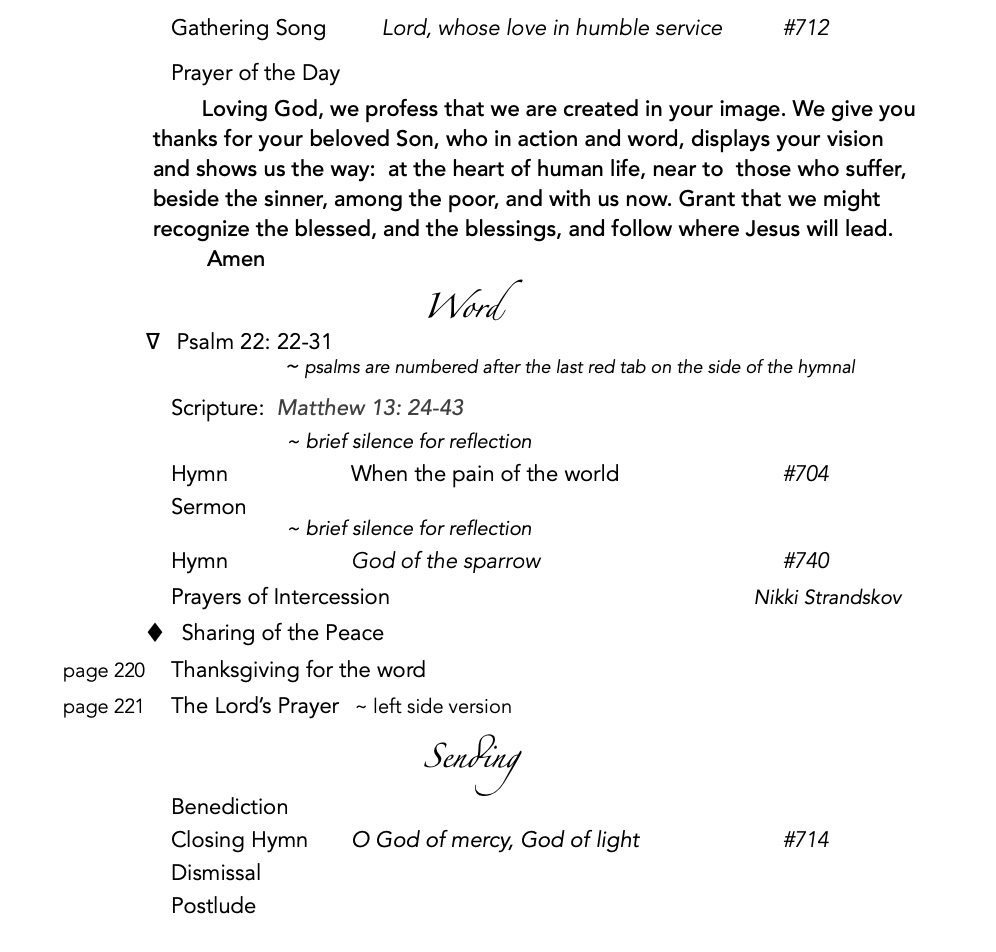Audio Recording



Matthew 13:24-43
Jesus put before them another parable:
“The kingdom of heaven may be compared to someone who sowed good seed in his field; but while everybody was asleep, an enemy came and sowed weeds among the wheat, and then went away. So when the plants came up and bore grain, then the weeds appeared as well. And the slaves of the householder came and said to him, “Master, did you not sow good seed in your field? Where, then, did these weeds come from?’ He answered, “An enemy has done this.’ The slaves said to him, “Then do you want us to go and gather them?’ But he replied, “No; for in gathering the weeds you would uproot the wheat along with them.
Let both of them grow together until the harvest; and at harvest time I will tell the reapers, Collect the weeds first and bind them in bundles to be burned, but gather the wheat into my barn.’ ”
He put before them another parable: “The kingdom of heaven is like a mustard seed that someone took and sowed in his field; it is the smallest of all the seeds, but when it has grown it is the greatest of shrubs and becomes a tree, so that the birds of the air come and make nests in its branches.”
He told them another parable: “The kingdom of heaven is like yeast that a woman took and mixed in with three measures of flour until all of it was leavened.”
Jesus told the crowds all these things in parables; without a parable he told them nothing. This was to fulfill what had been spoken through the prophet: “I will open my mouth to speak in parables; I will proclaim what has been hidden from the foundation of the world.”
36Then he left the crowds and went into the house. And his disciples approached him, saying, “Explain to us the parable of the weeds of the field.” 37He answered, “The one who sows the good seed is the Son of Man; 38the field is the world, and the good seed are the children of the kingdom; the weeds are the children of the evil one, 39and the enemy who sowed them is the devil; the harvest is the end of the age, and the reapers are angels. 40Just as the weeds are collected and burned up with fire, so will it be at the end of the age. 41The Son of Man will send his angels, and they will collect out of his kingdom all causes of sin and all evildoers, 42and they will throw them into the furnace of fire, where there will be weeping and gnashing of teeth. 43Then the righteous will shine like the sun in the kingdom of their Father. Let anyone with ears listen!
The gospel of the Lord…. Thanks be to God.
I suspect most of us have been taught or conditioned to hear the first parable about weeds and wheat growing in the same field to be about the weeds and wheat growing in the same field, and whether the evil one’s weeds should be pulled, and to wonder how the wheat will be harvested separately from the weed seeds at harvest time, and who are those evil weeds anyway, and will I be burned or gathered into the barn? It’s a cautionary tale whose explanation doesn’t seem to be in sync with the parable itself. Instead of clarifying things, the insider information Jesus gives the disciples is confusing and makes us edgy. Our attention is focused on the fate of the weeds.
Well. If we start again, what the parable says is that “the kingdom of heaven may be compared to someone.” Someone who sowed good seed and left it alone, and let it grow.
The second parable is about a tiny mustard seed that someone took and planted in his field — and the third is about a small amount of sourdough sponge that a woman planted in a bag of flour.
These three parables are not about judgment, separation, sin, or eternity – but rather, they are about the mysterious hidden growth of the kingdom of heaven in earthly ways, in human lives and in living communities. Growth, not weeds.
That’s what Jesus was teaching about. The kingdom of heaven had come near – and you might not notice or be impressed, but it was/is a living thing, growing inexorably just like grain and tiny seeds and yeast. And it’s not a mono crop. The earthy kingdom of heaven doesn’t make everything new. This is just the beginning. Old seeds are still lying dormant in the dirt, ready to grow when the field is prepared and sown with good seed. But time will do its work. The wheat will head out, the mustard plant will grow less spindly and bush out, even three measures of flour will eventually be raised by just a bit of yeast. The trio of parables Jesus taught are hopefully realistic descriptions of God coming near in the midst of it all.
Matthew had a different use for these parables, adding the allegorical explanation to the wheat and weeds. That explanation is not believed to be original to Jesus, since it changes the message of the parable completely. Matthew had reasons for this. He lived and wrote at an apocalyptic time. They expected the end of the age. Jerusalem was demolished, it was time to choose which empire you would support and be part of – Rome or Christ’s. It was a very black and white time for the Christian Jewish community in diaspora.
There is a strong contingency of modern Christians (and this is mostly an American dynamic) who don’t pay attention to the historical, cultural setting of the gospels, believing that it is all directly applicable to us in our time, and that somehow, Christians are still the ones under threat. Theirs is a model of religion with stark divisions focused on purity and distinctions and judgment. Seeing culture through that lens, it is natural to look for enemies and evil somewhere ‘out there’ and miss the point of Jesus’ message. The kingdom of heaven is about growth and grace and the hidden, nuanced, complicit, complex, interconnected lives it touches. Our lives.
And we know something about weeds. A weed is a perfectly good plant growing where you don’t want it to be. Many, if not all weeds, have intrinsic value and things to contribute for those with eyes to see. I can’t grow a good container of spinach, for example, and only have a few weeks of good baby lettuce before the plants get bitter or leggy. But dandelion, lamb’s quarters, plantain, nettles and purslane grow really well and are actually more nutritious.. Milkweed is being reintroduced even in gardens for the sake of monarch butterflies. Nettles are a beneficial companion plant. Native weeds belong here and have a lot of benefits for the soil, insect populations, birds, and even us, while a beautifully manicured lawn is a biological wasteland.
I do realize I’m not talking about weeds in a wheat field, and mustard plants were invasive even in Jesus’ time, but the point of the parable is that the wise farmer recognized that weeds and wheat needed to grow together, root systems were too fragile to separate, and in the fullness of time all would be sorted. That’s what Christians who take the parable and it’s explanation literally tend to leave out. The benevolent element of time. And that God’s plan for this earthly enterprise isn’t – never has been – to pluck out a faithful remnant. The goal is to create abundant, diverse, flourishing life. That is fostered through inspiration and love and compassion and empathy, not judgment and self-righteousness.
Martin Luther’s small catechism teaches this in the ten commandments. This is the Eighth Commandment: You shall not give false testimony against your neighbor.
“What does this mean?”, he asks. “We should fear and love God so that we do not tell lies about our neighbor, betray him, slander him, or hurt his reputation, but defend him, speak well of him, and explain everything in the kindest way.” Luther states the law, but explains it with grace, teaching how to love, respect and live with our neighbor.
Having said this, I recognize that much of scripture is judgmental and warning in nature. And I do believe in final judgment, but I believe it will be the judgment of deep love that strips away all pretenses and pride, that will dissolve our hard candy coating leaving our soft, delicious centers, that we will see ourselves face to face instead of through a mirror, and in the gaze of God all will be made right and true and blessed.
But in the meantime, wouldn’t it be something if we could practice that kind of judgment? To gaze in love so patient and calm and wide that the hard candy coatings, and pretenses and defensiveness and arrogance and fears of both observer and observed all melt away. It might be a small thing in this world of enormous suffering and staggering problems, but small things grow.
May it be so.
